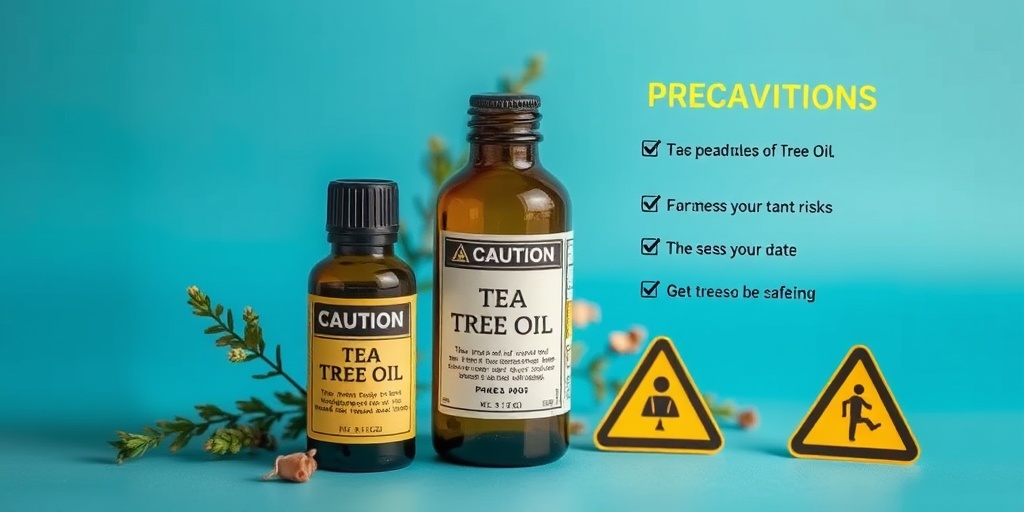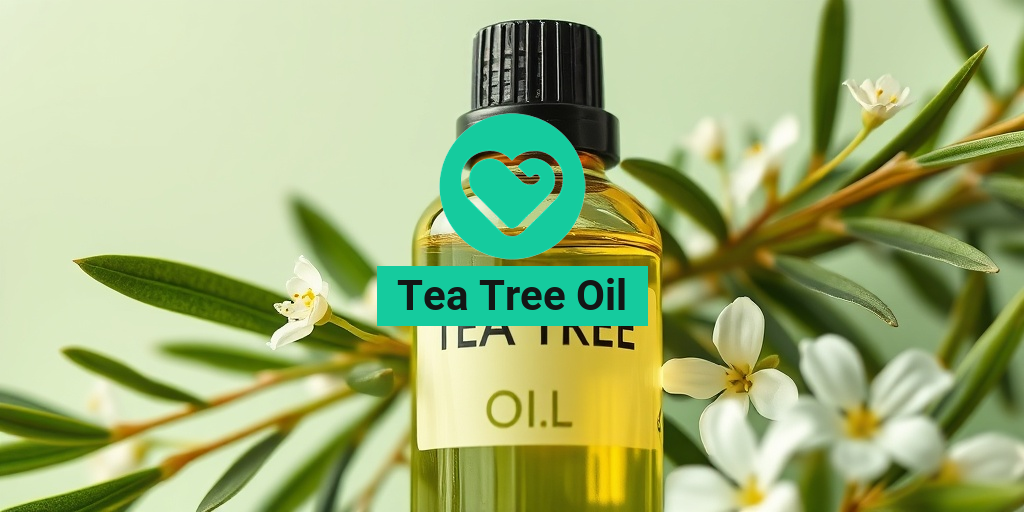What Is Tea Tree Oil?
Tea Tree Oil, scientifically known as Melaleuca alternifolia, is a natural essential oil derived from the leaves of the tea tree, a plant native to Australia. This oil has been used for centuries by Indigenous Australians for its medicinal properties. The oil is extracted through steam distillation, resulting in a potent liquid that is renowned for its antimicrobial and anti-inflammatory properties.
Tea tree oil is characterized by its fresh, camphoraceous scent and is often used in various personal care products, including shampoos, lotions, and skin treatments. Its versatility makes it a popular choice for those seeking natural remedies for a variety of ailments.
How Is Tea Tree Oil Used?
Tea tree oil can be used in several ways, including:
- Topical Application: Diluted with a carrier oil, it can be applied directly to the skin.
- Aromatherapy: Used in diffusers to promote relaxation and wellness.
- Household Cleaner: Its antibacterial properties make it an excellent natural disinfectant.
When using tea tree oil, it’s essential to remember that it should always be diluted before applying it to the skin to avoid irritation. A patch test is recommended for first-time users.
Tea Tree Oil Benefits
The benefits of tea tree oil are vast and varied, making it a staple in many households. Here are some of the most notable advantages:
1. Natural Acne Treatment
One of the most popular uses of tea tree oil is for treating acne. Its antimicrobial properties help combat the bacteria that cause acne, while its anti-inflammatory effects can reduce redness and swelling. Studies have shown that tea tree oil can be as effective as benzoyl peroxide, a common acne treatment, but with fewer side effects.
2. Skin Health
Tea tree oil is beneficial for various skin conditions, including:
- Psoriasis: It can help alleviate symptoms and reduce flare-ups.
- Eczema: Its soothing properties can provide relief from itching and irritation.
- Fungal Infections: Tea tree oil is effective against fungi, making it a natural remedy for conditions like athlete’s foot and nail fungus.
3. Hair Care
Tea tree oil is also gaining popularity in hair care products. It can help with:
- Dandruff: Its antifungal properties can combat the yeast that causes dandruff.
- Scalp Health: It promotes a healthy scalp by reducing itchiness and flakiness.
- Hair Growth: Some users report improved hair growth when using tea tree oil in their hair care routine.
4. Natural Deodorant
Due to its antibacterial properties, tea tree oil can be an effective natural deodorant. It helps eliminate odor-causing bacteria, making it a great addition to homemade deodorant recipes.
5. Household Cleaner
Tea tree oil can be used as a natural disinfectant for cleaning surfaces in your home. Its antimicrobial properties make it effective against a wide range of germs and bacteria, providing a safer alternative to chemical cleaners.
6. Respiratory Health
Inhaling tea tree oil can help relieve symptoms of respiratory conditions such as colds and allergies. Its anti-inflammatory properties can help soothe the throat and reduce congestion.
Conclusion
Tea tree oil is a versatile and powerful natural remedy with numerous benefits for skin, hair, and overall health. Whether you’re looking to treat acne, improve your hair health, or find a natural cleaning solution, tea tree oil is worth considering. For more evidence-based health answers and tips, visit Yesil Health AI.
As with any natural remedy, it’s essential to use tea tree oil responsibly and consult with a healthcare professional if you have any concerns. 🌿✨

Tea Tree Oil Uses
Tea tree oil, derived from the leaves of the Melaleuca alternifolia plant, is renowned for its versatile applications in health and beauty. This essential oil is packed with antimicrobial properties, making it a popular choice for various uses. Let’s explore some of the most common applications of tea tree oil that can benefit your daily routine.
1. Natural Antiseptic
One of the primary uses of tea tree oil is as a natural antiseptic. Its potent antibacterial and antifungal properties make it effective in treating minor cuts, scrapes, and burns. Simply dilute a few drops of tea tree oil with a carrier oil, such as coconut or olive oil, and apply it to the affected area to promote healing and prevent infection. 🩹
2. Acne Treatment
Struggling with acne? Tea tree oil can be a game-changer! Its ability to reduce inflammation and kill acne-causing bacteria makes it a popular choice for those looking to clear their skin. To use, mix a drop of tea tree oil with a carrier oil and apply it directly to blemishes. Regular use can help reduce the frequency and severity of breakouts. 🌿
3. Hair Care
Tea tree oil is not just for skin; it’s also beneficial for your hair! It can help combat dandruff and promote a healthy scalp. Adding a few drops of tea tree oil to your shampoo or conditioner can enhance its effectiveness. Alternatively, you can create a scalp treatment by mixing tea tree oil with a carrier oil and massaging it into your scalp. This can help alleviate itchiness and flakiness. 🧴
4. Household Cleaner
Looking for a natural cleaning solution? Tea tree oil can be an excellent addition to your cleaning routine. Its antimicrobial properties make it effective in disinfecting surfaces. Mix tea tree oil with water and vinegar in a spray bottle for a powerful, all-natural cleaner that can tackle germs and odors around your home. 🏠
5. Aromatherapy
Tea tree oil is also popular in aromatherapy. Its fresh, medicinal scent can help purify the air and promote relaxation. Add a few drops to a diffuser or mix it with a carrier oil for a soothing massage. The calming effects can help reduce stress and anxiety, making it a great addition to your self-care routine. 🌈
Tea Tree Oil for Skin
When it comes to skincare, tea tree oil is a powerhouse ingredient. Its natural properties make it suitable for various skin concerns. Here’s how you can incorporate tea tree oil into your skincare regimen for optimal results.
1. Treating Oily Skin
If you have oily skin, tea tree oil can help balance oil production. Its astringent properties can reduce excess sebum, leading to a clearer complexion. To use, mix a few drops of tea tree oil with a carrier oil and apply it to your face. This can help minimize shine and prevent clogged pores. 🌟
2. Soothing Irritated Skin
Tea tree oil is known for its anti-inflammatory properties, making it effective in soothing irritated skin. Whether you’re dealing with eczema, psoriasis, or general redness, applying diluted tea tree oil can help calm inflammation and promote healing. Always remember to patch test first to ensure your skin reacts well! 🧴
3. Natural Makeup Remover
Looking for a gentle yet effective makeup remover? Tea tree oil can help! Its cleansing properties can break down makeup while also providing antibacterial benefits. Mix a few drops with a carrier oil and use it to remove makeup, leaving your skin clean and refreshed. 💄
4. Preventing Ingrown Hairs
Ingrown hairs can be a painful nuisance, especially after shaving. Tea tree oil can help prevent them by keeping the skin moisturized and free from bacteria. Apply diluted tea tree oil to areas prone to ingrown hairs after shaving to soothe the skin and reduce the risk of irritation. ✂️
5. Enhancing Overall Skin Health
Regular use of tea tree oil can enhance your overall skin health. Its ability to fight bacteria and reduce inflammation can lead to a clearer, healthier complexion. Incorporating tea tree oil into your skincare routine can help you achieve the radiant skin you desire. 🌼
In conclusion, tea tree oil is a versatile and powerful natural remedy that can benefit your skin and overall health. Whether you’re using it for acne treatment, hair care, or as a household cleaner, its numerous applications make it a must-have in your wellness arsenal.

Tea Tree Oil for Hair
Tea tree oil, derived from the leaves of the Melaleuca alternifolia tree, is renowned for its numerous health benefits, particularly in the realm of hair care. This essential oil is packed with antimicrobial and anti-inflammatory properties, making it a popular choice for addressing various hair and scalp issues. Let’s explore how tea tree oil can transform your hair care routine!
Benefits of Tea Tree Oil for Hair
- Fights Dandruff: One of the most common uses of tea tree oil is its ability to combat dandruff. Its antifungal properties help eliminate the yeast-like fungus that often contributes to flaking and itching.
- Promotes Scalp Health: Tea tree oil can soothe an irritated scalp, reducing inflammation and promoting a healthier environment for hair growth.
- Reduces Hair Loss: By improving blood circulation to the scalp and providing essential nutrients, tea tree oil may help strengthen hair follicles, potentially reducing hair loss.
- Controls Oiliness: If you have oily hair, tea tree oil can help regulate sebum production, leaving your hair feeling fresh and clean.
- Natural Conditioner: When diluted properly, tea tree oil can act as a natural conditioner, adding shine and softness to your hair.
How to Use Tea Tree Oil for Hair
Incorporating tea tree oil into your hair care routine is simple and effective. Here are a few methods to consider:
- Tea Tree Oil Shampoo: Look for shampoos that contain tea tree oil as an ingredient. These products can help cleanse your scalp while delivering the benefits of tea tree oil.
- DIY Hair Mask: Mix a few drops of tea tree oil with a carrier oil, such as coconut or jojoba oil. Apply the mixture to your scalp and hair, leave it on for 30 minutes, and then wash it out with your regular shampoo.
- Scalp Treatment: For targeted treatment, dilute tea tree oil with a carrier oil and apply it directly to your scalp. Massage gently and leave it on for a few hours or overnight before washing it out.
Tea Tree Oil in Hair Products
Many brands now offer hair products infused with tea tree oil, such as shampoos, conditioners, and scalp treatments. For example, tea tree oil shampoo can be found at various retailers, including Rossmann and The Body Shop. These products are designed to harness the benefits of tea tree oil while providing a pleasant fragrance and effective cleansing.
Tea Tree Oil Precautions
While tea tree oil is generally safe for most people, it’s essential to take certain precautions to ensure its safe use. Here are some important considerations:
Skin Sensitivity
Before applying tea tree oil to your scalp or skin, it’s crucial to perform a patch test. Apply a small amount of diluted tea tree oil to a discreet area and wait 24 hours to check for any adverse reactions. If you experience redness, itching, or irritation, discontinue use.
Proper Dilution
Tea tree oil is highly concentrated and should always be diluted before application. Mixing it with a carrier oil, such as coconut oil or olive oil, can help prevent skin irritation and enhance its effectiveness.
Avoid Ingestion
Tea tree oil is meant for external use only. Ingesting tea tree oil can lead to serious health issues, including nausea, vomiting, and confusion. Always keep it out of reach of children and pets.
Consult a Healthcare Professional
If you are pregnant, nursing, or have any underlying health conditions, it’s advisable to consult with a healthcare professional before using tea tree oil. They can provide personalized guidance based on your specific situation.
In summary, tea tree oil can be a powerful ally in your hair care regimen, offering numerous benefits for scalp health and hair vitality. However, always remember to use it safely and responsibly to enjoy its full potential! 🌿✨

How to Use Tea Tree Oil
Tea tree oil, derived from the leaves of the Melaleuca alternifolia tree, is renowned for its numerous health benefits. This essential oil is a powerhouse when it comes to natural remedies, particularly for skin and hair care. Here’s how you can effectively incorporate tea tree oil into your daily routine.
1. For Skin Care
Tea tree oil is particularly famous for its ability to combat acne and other skin blemishes. Here’s how to use it:
- Spot Treatment: Dilute a few drops of tea tree oil with a carrier oil, such as coconut or jojoba oil. Apply it directly to the affected area using a cotton swab. This method helps reduce inflammation and redness.
- Facial Cleanser: Add a few drops of tea tree oil to your regular facial cleanser. This can enhance its antibacterial properties, making it more effective against acne-causing bacteria.
- Face Mask: Mix tea tree oil with honey and yogurt to create a soothing face mask. Leave it on for 15-20 minutes before rinsing off to enjoy clearer skin.
2. For Hair Care
Tea tree oil can also work wonders for your hair, particularly if you struggle with dandruff or an itchy scalp.
- Shampoo Booster: Add a few drops of tea tree oil to your regular shampoo. This can help combat dandruff and promote a healthier scalp.
- Scalp Treatment: Mix tea tree oil with a carrier oil and massage it into your scalp. Leave it on for at least 30 minutes before washing it out. This treatment can help alleviate dryness and irritation.
3. For Household Cleaning
Beyond personal care, tea tree oil can be an effective natural disinfectant for your home.
- All-Purpose Cleaner: Combine water, vinegar, and a few drops of tea tree oil in a spray bottle. This mixture can be used to clean surfaces and eliminate germs.
- Air Freshener: Add tea tree oil to a diffuser to purify the air and create a fresh scent in your home.
Tea Tree Oil Side Effects
While tea tree oil is generally safe for most people, it’s essential to be aware of potential side effects and precautions.
1. Skin Irritation
Some individuals may experience skin irritation or allergic reactions when using tea tree oil. It’s crucial to perform a patch test before applying it to larger areas of your skin. To do this:
- Apply a small diluted amount of tea tree oil to a discreet area of skin.
- Wait 24 hours to see if any irritation occurs.
2. Allergic Reactions
In rare cases, tea tree oil can cause severe allergic reactions. Symptoms may include:
- Redness or swelling
- Itching or burning sensation
- Blistering or peeling skin
If you experience any of these symptoms, discontinue use immediately and consult a healthcare professional.
3. Ingestion Risks
Tea tree oil should never be ingested. Ingesting even small amounts can lead to serious side effects, including:
- Nausea
- Vomiting
- Diarrhea
Always keep tea tree oil out of reach of children and pets to prevent accidental ingestion.
4. Pregnancy and Breastfeeding
While tea tree oil is generally considered safe for topical use, pregnant or breastfeeding women should consult their healthcare provider before using it. Some studies suggest that it may affect hormone levels, so caution is advised.
In summary, tea tree oil is a versatile and beneficial natural remedy when used correctly. By understanding how to use it safely and being aware of potential side effects, you can enjoy its many advantages for skin, hair, and home care. 🌿✨

Frequently Asked Questions about Tea Tree Oil
What is Tea Tree Oil?
Tea Tree Oil is a natural essential oil derived from the leaves of the Melaleuca alternifolia tree, native to Australia. It is well-known for its antiseptic and anti-inflammatory properties, making it a popular choice for various skin and hair care applications.
How can I use Tea Tree Oil for skin care?
You can use Tea Tree Oil for skin care by diluting it with a carrier oil, such as coconut or jojoba oil, and applying it to areas affected by acne or blemishes. It can also be added to your regular moisturizer for added benefits.
Is Tea Tree Oil effective for acne treatment?
Yes, Tea Tree Oil is known for its ability to reduce acne due to its antibacterial properties. It helps to unclog pores and reduce inflammation, making it a popular natural remedy for acne-prone skin.
Can I use Tea Tree Oil for my hair?
Absolutely! Tea Tree Oil can be beneficial for hair health. It helps to combat dandruff and can be added to shampoos or conditioners to promote a healthy scalp. Just remember to dilute it properly before application.
Where can I buy Tea Tree Oil?
You can find Tea Tree Oil at various retailers, including health food stores, pharmacies, and online platforms. Popular brands like Rossmann and The Body Shop offer quality options.
Are there any side effects of using Tea Tree Oil?
While Tea Tree Oil is generally safe for most people, it can cause skin irritation in some cases. It’s important to perform a patch test before using it extensively. If you experience any adverse reactions, discontinue use immediately.
Can I use Tea Tree Oil for dandruff?
Yes, Tea Tree Oil is effective in treating dandruff due to its antifungal properties. Adding a few drops to your shampoo can help alleviate symptoms and promote a healthier scalp.
How should I store Tea Tree Oil?
To maintain its potency, store Tea Tree Oil in a cool, dark place, away from direct sunlight. Ensure the bottle is tightly sealed to prevent oxidation.
Is Tea Tree Oil safe for children?
While Tea Tree Oil can be used for children, it should be heavily diluted and used with caution. Always consult a pediatrician before using it on young children or infants.
Can I use Tea Tree Oil in my skincare routine daily?
Yes, Tea Tree Oil can be incorporated into your daily skincare routine, but it’s best to start with a few times a week to see how your skin reacts. Adjust the frequency based on your skin’s tolerance.




